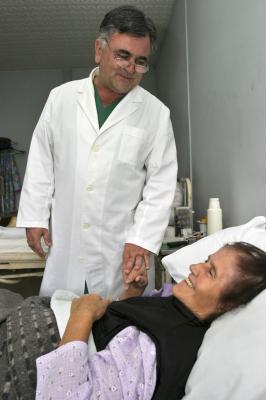
March 12, 2015 — Women veterans who had specialized heart tests were younger and more likely to be obese, depressed and suffer from post-traumatic stress disorder than male veterans, according to a study published in an American Heart Association journal.
The number of women cared for by Veteran Affairs facilities has doubled in the past decade, providing a unique opportunity to examine the heart health of women veterans. The study reveals women veterans face a homefront battle against heart disease that's significantly different from men veterans and women who have never served in the military.
Although chest pain was a common reason for women to undergo cardiac catheterization, doctors were less likely to find blockages in women’s arteries that could lead to a heart attack or stroke, said lead study author Melinda B. Davis, M.D., cardiologist at the University of Michigan Frankel Cardiovascular Center and the VA Ann Arbor Healthcare System.
The findings may prompt a closer look at stress-induced heart disease, and coronary microvascular disease —spasms in the walls of very small arterial blood vessels which can lead to severe and long-lasting angina — as causes of chest pain for women veterans.
Additional findings from the national study of nearly 86,000 veterans, including 3,181 women:
- Generally women are older and have more risk factors for heart disease such as hypertension, diabetes and high cholesterol than men, but women veterans were younger and had fewer heart disease risks than men veterans;
- Women veterans had higher rates of depression (55.3 percent compared to 31.4 percent) and post-traumatic stress disorder (PTSD, 20 percent compared to 16 percent) than men veterans, highlighting mental health as a potential risk factor for heart disease.
- Women veterans had similar one-year outcomes after the cardiac catheterization. They were less likely to leave the hospital with heart medications even if doctors found acute disease.
The study resulted from the national Veterans Administration Clinical Assessment Reporting and Tracking (CART) program analysis of veterans undergoing cardiac catheterization in the VA system. The median age for women veterans having the heart test was about 57, six years younger than the median age of men veterans.
“Investigating the reasons behind these findings and developing effective approaches based on those insights could potentially help address the gender differences in heart disease we see in the general population,” said senior study author Claire Duvernoy, M.D., chief of cardiology at VA Healthcare Ann Arbor and cardiologist at the U-M Cardiovascular Center.
The VA Ann Arbor and University of Michigan, along with colleagues at the VA Eastern Colorado Health Care System and the University of Colorado School of Medicine, published the study in Circulation: Cardiovascular Quality and Outcomes, an AHA journal. A portion of the March issue is dedicated to research in women.
Women are generally underrepresented in heart disease research, according to the AHA. Because of this gap, physicians lack important information about how women might respond differently to heart disease, have different symptoms and need different diagnostic approaches and treatments.
For more information: www.aha.org


 January 05, 2026
January 05, 2026 









